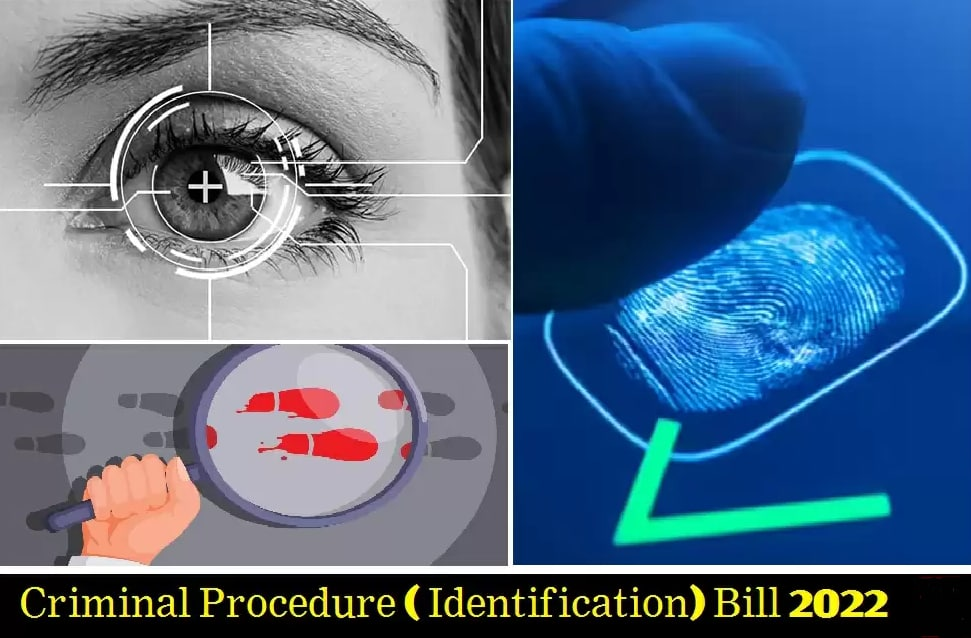Criminal Procedure (Identification) Bill, 2022

Copyright infringement is not intended
Context: The Union Home Minister introduced the Criminal Procedure (Identification) Bill 2022 in parliament.
Details
- The Union Home Minister Amit Shah introduced the Criminal Procedure (Identification) Bill 2022 in the Lok Sabha.
- It would authorise the police to take and preserve records of convicts and other persons for the purpose of identification and investigations.
- Once the new Bill is introduced, it would repeal the existing The Identification of Prisoners Act, 1920.
Key features of the Bill
- The Criminal Procedure (Identification) Bill, 2022, would allow the police and prison authorities to collect, store and analyse physical and biological samples, including retina and iris scans
- The Bill empowers the police to collect finger impressions, palm print impression, footprint impression, iris and retina scan, footprint impressions, physical, biological samples and their analysis, behavioural attributes including signatures, handwriting or any other examination.
- The Bill also seeks to apply these provisions to persons held under any preventive detention law.
- As per the provisions of the new Bill any person convicted, arrested or detained under any preventive detention law will be required to provide the above mentioned measurements to the police or a prison official.
- If any person resists or refuses to allow taking of such measurements, it shall be lawful for the police officer or prison officer to take such measurements in such manner as may be prescribed.
- Resistance to or refusal to allow the taking of measurements under this Act shall be deemed to be an offence under section 186 of the Indian Penal Code.
Implementing body
- The National Crime Records Bureau (NCRB) will be the repository of physical and biological samples, signature and handwriting data that can be preserved for at least 75 years.
- The State Government and Union territory Administration may notify an appropriate body to collect preserve and share the measurements in their respective jurisdictions.
Criminal Justice System in India
- The Criminal Justice System in India is a century-old system established by the colonial power.
- This system hardly experienced any substantial changes even after 70 years of Independence.
- The Criminal Justice system includes the agencies of government charged with enforcing law and order, deciding criminal offences, and correcting criminal conduct.
- Criminal justice system has the power to control crime and punish criminals and ensure rule of law in the society.
- Source of Criminal law in India: Indian Penal Code of 1860, Protection of Civil Rights Act 1955, etc.
- The Criminal Justice System investigates, decides whether a person is guilty or not, and then imposes penalties on those who violate the established laws.
- Criminal law and criminal procedure are part of the concurrent list of the seventh schedule of the constitution.
Why reform the Indian Criminal Justice System?
- Less than 20% of the total people booked for criminal offences are finally convicted. Low rate of conviction points to the inefficiency of the Criminal Justice System of India.
- Century old Indian Criminal Justice System has promoted dissatisfaction among people due to its lengthy and costly nature and also increased burden on the judiciary.
- Lack of Cooperation and coordination among the judiciary, the prosecution and the police.
- A large number of guilty go unpunished. On the other hand many innocent people remain as undertrial prisoners as well. According to NCRB data, 67% of our total prison population comprises undertrial prisoners.
- Nature of crime is changing fast in the world of digital connectivity and technological innovations.
Steps taken by government to reform the system
- The entire Code of Criminal Procedure (CrPC) was amended in 1973.
- The Vohra Committee was appointed for reforming the Criminal Justice System in India.
- Malimath Committee was formed by the government to suggest reform in the Indian criminal justice system.



1.png)
